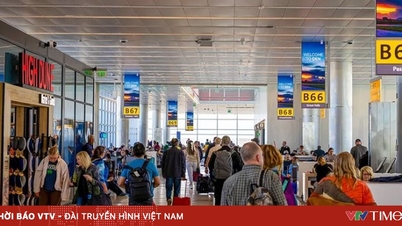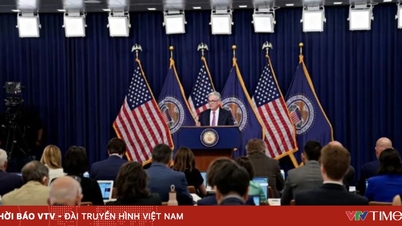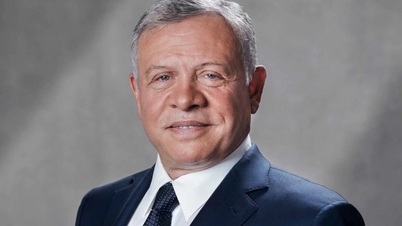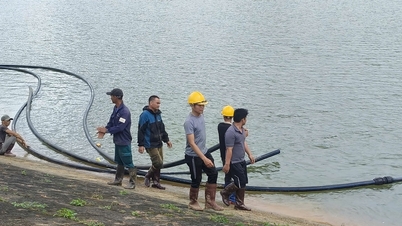
Passengers wait tiredly at the airport in Florida on October 30 due to flight delays - Photo: AFP
With thousands of air traffic controllers and airport security personnel working without pay, the Federal Aviation Administration (FAA) was forced to implement an unprecedented measure: cutting 4-10% of flight traffic at 40 major airports nationwide from November 7.
Drags along a series of troubles
The prolonged government shutdown has thrown the US aviation system into chaos. More than a month without pay has left many air traffic controllers looking for second jobs, taking temporary leave or working through stress and exhaustion.
The FAA estimates the US is short as many as 3,000 air traffic controllers, with at least 11,000 other essential workers also working without pay.
Last week, the FAA recorded 39 air traffic control facilities reporting staffing shortages, three times the normal level before the shutdown. FAA Administrator Bryan Bedford warned: "We are starting to see evidence of fatigue building up in the system. Action is needed now to alleviate the pressure."
Facing the risk of airspace chaos, the FAA issued an emergency order requiring airlines to gradually reduce flight capacity: 4% from November 8, 6% on November 11, 8% on November 13 and 10% on November 14. Airports in Atlanta, Chicago, Dallas, New York, Los Angeles and San Francisco are all on the affected list, including three airports in the Washington DC area, according to the Guardian.
The impact was immediate. Delta Air Lines canceled at least 170 flights, Southwest Airlines more than 120, and United Airlines cut 4% of its schedule over the three-day weekend. American Airlines estimated it would cut 220 flights a day before entering a more in-depth adjustment period.
As Thanksgiving approaches, many travelers are forced to turn to less risky options: long-distance car rentals, flying around smaller airports, or even canceling their trips altogether.
It’s not just major routes that are affected, many smaller routes and rural areas are also affected. The Washington Post reports that Alaska Airlines, which serves many remote destinations in Alaska, has been forced to maintain essential routes and cut back on more popular routes.
Politicians , especially Democrats, accuse the Trump administration of "weaponizing" the airline industry to exert political pressure. "This is a political act to force Democrats to accept their budget," said Congressman Steve Cohen.
Meanwhile, Republican Senator Ted Cruz accused the rival party of "holding the government and the airspace system hostage".
Global impact
As the hub of the global airline network, any disruption to U.S. air travel quickly ripples around the world . While the FAA has not mandated cuts to international routes, delays, congestion and staffing shortages at hubs have forced many European and Asian airlines to adjust schedules.
The U.S. travel industry is also feeling the pressure. From Orlando and Miami to East and West Coast tourist cities, businesses are worried about a sharp decline in passenger numbers during the peak season. The U.S. Travel Association warns that confidence in the American airline experience is being “eroded,” with long-term effects that will not be easy to fix.
Aviation safety is also being affected. The current government shutdown is slowing the investigation into the UPS cargo plane crash in Louisville that killed 13 people, as federal agencies are having trouble coordinating due to staff shortages.
The biggest risk that experts fear is the possibility of a “system collapse” if the shutdown continues. The US airspace system nearly fell into chaos last week, after 35 facilities reported a severe shortage of air traffic controllers on a day of bad weather, causing delays at many major airports, the New York Times reported.
"We are facing a near-shutdown of our national airspace. We cannot continue to operate without the safety degradation. This is an extremely serious situation," aviation expert John Nance told ABC News.
Analysts have called the situation “a multi-week winter storm that hits dozens of airports at once.” Airlines may have prepared for storms and technical problems, but a record-breaking government shutdown that has crippled the aviation system is unprecedented.
Still, airlines are trying to remain cautious. “We will never compromise safety under any circumstances,” said United Airlines CEO Scott Kirby. However, he acknowledged that the airline has to constantly adjust its flight schedule on a daily basis to minimize damage.
Meanwhile, many believe that the government’s announcement of a reduction in flight capacity will put pressure on both parties to return to the negotiating table and make a quick decision. But whether that is the real goal or not, passengers, businesses and global markets are directly affected by the political confrontation in Washington.
Crisis spreads to food stamps
The prolonged government shutdown has also paralyzed the SNAP food assistance program for about 41-42 million low-income Americans.
Reuters news agency reported that federal Judge John McConnell blocked the Trump administration's plan to issue only partial food stamps this month, requiring the Department of Agriculture to pay 100% of the benefits by November 7.
However, the Justice Department immediately appealed the decision, raising concerns that this essential subsidy could be "frozen" just when people need it most.
Source: https://tuoitre.vn/hang-khong-my-rung-lac-vi-chinh-phu-dong-cua-qua-lau-20251108022639683.htm






![[Photo] "Ship graveyard" on Xuan Dai Bay](https://vphoto.vietnam.vn/thumb/1200x675/vietnam/resource/IMAGE/2025/11/08/1762577162805_ndo_br_tb5-jpg.webp)


































![[Video] Hue Monuments reopen to welcome visitors](https://vphoto.vietnam.vn/thumb/402x226/vietnam/resource/IMAGE/2025/11/05/1762301089171_dung01-05-43-09still013-jpg.webp)






































































Comment (0)